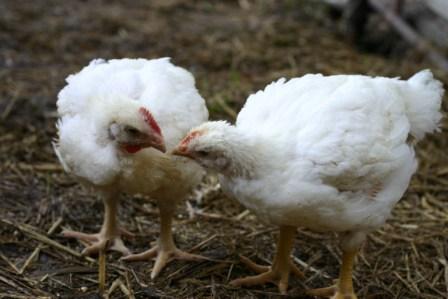
The recent recall of half a billion eggs has been bad news for the egg-consuming public. But it's been stellar for the birds. The recall has placed chickens -- and where they come from -- front and center in the national consciousness.
As a result of all the media coverage surrounding the recall -- from Diane Sawyer to Amy Goodman to multiple stories in the New York Times to CNN's Jane Velez-Mitchell -- countless Americans have been shocked to discover just how hideously chickens are treated in this country.
And that's a good thing for the birds, whose plight deserves to be better understood. At any given point in the U.S., hundreds of millions of chickens are crammed inside tiny cages, unable even to spread their wings or breathe fresh air. They live like this for their whole lives, each egg representing 34 hours of this unmitigated misery per bird. And Americans eat another 9 billion (yes billion) chickens annually; that's 200 times as many chickens as cattle, and almost 100 times as many chickens as pigs -- this means that anyone who "stops eating red meat" and replaces it with chicken or eggs is actually causing a LOT more suffering.
This new spotlight on chicken factory farms will surely create untold numbers of new vegetarians. But some people may still try to justify their meat and egg consumption. On that subject, a few years back, I wrote a letter to the New York Times, in which I noted that "eating your dogs or cats would be morally preferable [to eating chickens or other farmed animals], since they would have led a good life until you killed them." Boy did I get some angry mail; some people actually thought I was in favor of eating Fido and Fluffy, even though my letter ends with a clear entreaty to stop eating all animals.
I have wondered for decades about this curious lapse in logic: Why on earth do people who, to their credit, loathe cruelty to dogs and cats, think nothing of eating a chicken, turkey, pig, or other farmed animal? After all, these animals are made of flesh, blood, and bone--just like dogs and cats. They experience the exact same five physiological senses (i.e., they see, hear, smell, taste, and feel). And they feel pain -- just like dogs, cats, and we do.
So what gives?
I did a small survey, asking ten people on the streets of Baltimore why they eat chickens, and all ten offered some variation of 1) "chicken is healthier than red meat"; and 2) "well, chickens are not as smart as pets."
The problem with their logic: It's just not true.
On the first point, health and wellness savant Kathy Freston dealt with what she calls "the false dichotomy" of giving up red meat to eat more birds. In a piece that I hope you will read, she discusses, especially, the issues of health and the environment, arguing convincingly that chicken consumption is just as bad for you and the environment as consuming cattle and pigs.
And on the intelligence point: In fact, chickens have cognitive capacities that are beyond those of both dogs and cats, as was made abundantly clear in a study that, just a few weeks ago, won one of two Australian Museum "Eureka Prizes" for the year. In the study, researchers from the top Australian agricultural school found that chickens are "social, intelligent creatures complete with Machiavellian tendencies to adjust what they say according to who is listening."
According to the Australian Museum's press release, the study proves that "chickens can share remarkably precise information about the presence of predators and the discovery of food. They typically communicate using sound variations, postures and visual displays."

The scientists point out that this method of sophisticated communication is a first with non-human animals. No animal behaviorist has found this type of detailed communication in any other non-human animal, including primates.
- Chickens know that something they can't see still exists -- something that is "beyond the capacity of small children."
- In The Development of Brain and Behaviour in the Chicken, Dr. Lesley Rogers, a professor of neuroscience and animal behavior, concludes, "[I]t is now clear that birds have cognitive capacities equivalent to those of mammals, even primates."
- Dr. Chris Evans, who authored the Eureka-award study explains that "[a]s a trick at conferences, I sometimes list these attributes, without mentioning chickens, and people think I'm talking about monkeys."
Summing up the evidence, Colorado State University Distinguished Professor Dr. Bernard Rollin notes that "chickens are ... complex behaviorally, do quite well in learning, show a rich social organization, and have a diverse repertoire of calls. Anyone who has kept barnyard chickens recognizes their significant differences in personality."
As Dr. Rollin rightly notes, people who have spent time with chickens know that some birds are gregarious and fearless, while others are more shy and watchful; some chickens enjoy human company, while others are standoffish, shy, or even a bit aggressive. Just like dogs, cats, and humans, each chicken is an individual.
For the same reason most of us wouldn't think of eating a dog or a cat -- because they are individuals -- we should also not eat chickens, pigs, or any animals.